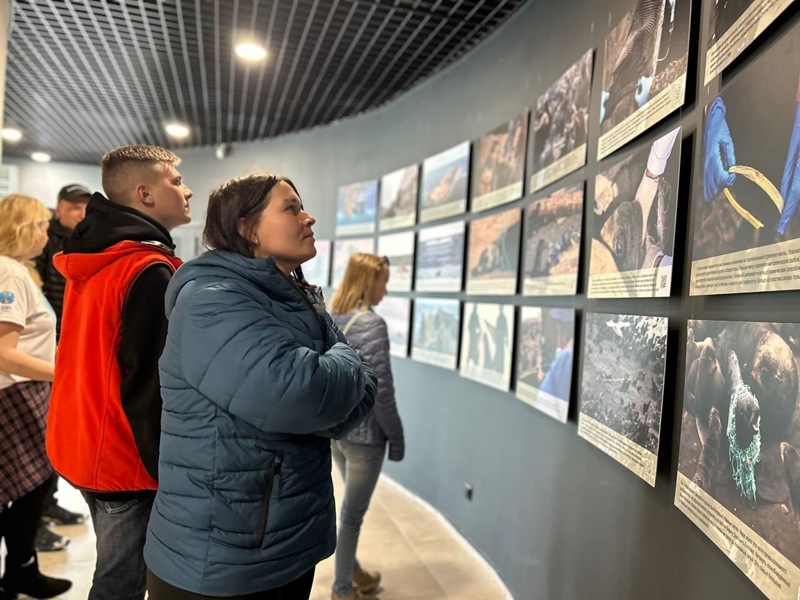The ocean groans under the yoke of human activity, and its silent inhabitants are increasingly becoming victims of our thoughtless attitude to nature. This disturbing reality became the main topic of a meeting with a volunteer of the Friends of the Ocean marine mammal group, which was held as part of the poignant photo exhibition “Trapped in a Noose: Saving Seals” organized by the Kronotsky Nature Reserve. The project, which covers several maritime regions of Russia, is dedicated to the desperate struggle for the lives of animals entangled in fragments of fishing nets and ubiquitous plastic debris.

Valentina Kosova, a volunteer at Friends of the Ocean, shared her difficult but vital experience of saving marine mammals on Tyulyany Island, lost in the Sea of Okhotsk, twelve kilometers from Sakhalin Cape Patience. Visitors to the event were able to see firsthand the scale of the tragedy thanks to the photo exhibition “Trapped in a Noose: Saving seals” and the film “Changes”, which unvarnished demonstrates the devastating effects of pollution of the oceans.
The project focuses on the rescue of seals, mainly fur seals and sea lions, which are trapped in fishing nets and plastic waste. Valentina Kosova spoke in detail about the incredible difficulties faced by rescuers and how these unfortunate creatures are freed from death traps. She vividly demonstrated fragments of nets, ropes and other debris – the very murder weapons that annually claim the lives of dozens of marine life. Special emphasis was placed on the fact that the prevention of such tragedies depends on each of us, on our daily choices and conscientiousness.
Anastasia Harkov, head of the School of Nature Defenders project group at the Kronotsky Nature Reserve, stressed that they call for conscious consumption, reduction of their plastic footprint, and active participation in volunteer programs. She noted that if humanity has caused this problem, then people should solve it through cleaning the coasts, supporting rescue operations and, most importantly, through changing their own habits. According to her, such meetings are an important step towards environmental education, and expressed gratitude to Valentina for her honest and touching story, and to all the guests for their concern for the fate of marine ecosystems.
The Northern Pacific Ocean is home to about thirty species of marine mammals, most of which, unfortunately, are already listed in the Red Books at various levels, and some are on the verge of complete extinction. These statistics are a stark reminder of the consequences of our impact on the planet.
Valentina Kosova noted with pain that every year they witness a horrific tragedy: animals die entangled in plastic debris and abandoned fishing nets. Seals and cetaceans are particularly affected, as once trapped in these deadly loops, they cannot free themselves on their own and slowly die from suffocation, starvation, or wounds. She strongly advised that if someone finds looped debris on the shore, such as packing tapes or plastic rings, it is necessary to cut them into small pieces. This simple procedure, she says, deprives garbage of its main danger – the ability to suffocate and maim living beings. And if possible, it is best to remove this garbage and take it out. Valentina is sure that such seemingly insignificant actions can save the lives of many marine life that have become hostages of our plastic age.
The event attracted those who care about the fate of the ocean depths and their inhabitants, those who are ready to hear this cry for help.
Nina Grigorieva, one of the visitors to the visit center of the Kronotsky Nature Reserve, shared her deep impressions after the meeting. She said that they were shown the entanglement materials that were brought from the island and taken directly from the seals, as well as looped ribbons collected on the ocean shore. According to her, the photo exhibition clearly demonstrates the catastrophic consequences of plastic and other debris entering the ocean, making us think about everyone’s personal responsibility.